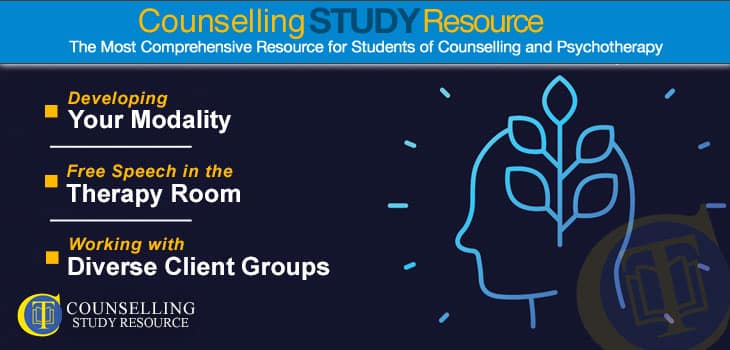092 – Developing Your Modality – Free Speech in the Therapy Room – Working with Diverse Client Groups
In episode 92 of the Counselling Tutor Podcast, Ken Kelly and Rory Lees-Oakes talk about whether and – if so – when it is advisable to add to your original modality. In ‘Practice Matters’, Rory discusses the issue of free speech in the therapy room. Finally, the presenters look again at working with diverse client groups.
Developing Your Modality (starts at 2.15 mins)
In our Counselling Tutor Facebook group, the question was recently asked: how long do you need to practise your original modality before you learn another?
With an apology for the male terminology, Rory uses the terms also applied in a 2012 article by Caro Bailey in Therapy Matters (the journal published by the British Association for Counselling & Psychotherapy): apprentice (e.g. when you’re a student), journeyman (e.g. once you’re qualified) and master craftsman (e.g. after you’re accredited – generally not before 450 hours’ practice).
Ken and Rory offer the following tips:
- Stick to the knitting, giving your modality time to settle: don’t rush to add other modalities as soon as you’re qualified. Instead of widening your range, study your original modality more deeply – so that you understand even better.
- It is natural to question the efficacy of your modality: it’s important to learn to trust the process.
- If your clients don’t fit your modality, then refer them on rather than desperately trying to add new skills (especially from reading: you can’t learn to practise safely from books alone).
- Remember that it can be confusing for clients to be faced with more than one modality (unless of course you are an integrative therapist who has learned how to combine these safely.
Free Speech in the Therapy Room (starts at 16.54 mins)
In ‘Practice Matters’, Rory looks at how to work with clients who have very different views to yours, including when they ask whether you agree with them.
It is important to remember that our role as counsellors is not to police or seek to change clients’ opinions.
Carl Rogers himself faced the issue of counselling someone whose views he really struggled to accept when he met with an officer in the South African army during the time of apartheid.
You can download Rory’s handout on free speech in therapy here; it is also available in the Handouts Vault and Counselling Study Resource (CSR).
Working with Diverse Client Groups (starts at 22.34 mins)
Is it possible to counsel someone who is of a different racial origin, religion/belief or sexuality (amongst other possible differences)? Ken and Rory assert that it is: after all, we are all human, which is itself a huge area of common ground.
Counselling training always involves looking in depth at equality and diversity. As part of this, it is really important that we reflect on our own heritage and how this could impact clients. Having this self-awareness is invaluable in helping to prevent therapists from falling into traps in the counselling room.
Differences are to be recognised, understood and celebrated.
The CSR contains lots of materials relating to equality and diversity, all within one monthly price. Plus, each lecture comes with a downloadable certificate as evidence of your learning activity.


